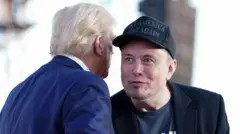The alliance between tech visionary Elon Musk and political firebrand Donald Trump might seem unconventional at first glance. Yet, as Donald Trump gears up for another presidential term, Elon Musk is not just on the sidelines; he’s stepping into a significant advisory role, tasked with spearheading a new “Department of Government Efficiency.” This begs the crucial question: why does Elon Musk, a figure once perceived as apolitical, so strongly support Donald Trump? This article delves into the multifaceted reasons behind this prominent endorsement, exploring ideological overlaps, potential business benefits, and the evolving dynamics of their relationship.
Ideological Alignment: Deregulation and Smaller Government
A cornerstone of Elon Musk’s support for Donald Trump lies in their shared vision of a less regulated and more streamlined government. Musk has long been a vocal critic of government bureaucracy, often lamenting how excessive regulations stifle innovation and hinder progress. This sentiment resonates deeply with core libertarian principles, a political philosophy Musk has openly identified with.
Musk’s pronouncements about colonizing Mars vividly illustrate his frustration with red tape. He has argued that humanity’s expansion beyond Earth – a grand ambition he champions – is contingent upon escaping the suffocating grip of bureaucracy. This perspective directly aligns with Donald Trump’s political platform, which consistently advocates for deregulation and a reduction in the size and scope of government. Trump’s promise to “dismantle government bureaucracy, slash excess regulations, cut wasteful expenditures, and restructure federal agencies,” as stated in his announcement of Musk’s new role, is music to the ears of someone who views governmental red tape as a primary obstacle to progress.
This ideological convergence extends to specific policy areas. Musk’s outspoken criticism of pandemic lockdowns in 2020 and his general skepticism towards extensive government intervention in the economy mirror Trump’s own stances. While Musk’s vision is often framed in terms of futuristic ambitions like space colonization, the underlying principle is a belief in minimizing governmental obstacles to individual and entrepreneurial endeavors. This shared antipathy towards expansive government provides a strong ideological basis for Musk’s support of Trump.
Business Interests and Potential Benefits
Beyond ideological alignment, pragmatic business considerations likely play a significant role in Musk’s support for Donald Trump. Musk’s vast business empire, encompassing companies like SpaceX and Tesla, is deeply intertwined with government policies and regulations. SpaceX, for instance, holds billions of dollars in government contracts, making it heavily reliant on the favorable regulatory environment shaped by Washington. Similarly, Tesla, operating in the heavily regulated automotive industry, faces ongoing scrutiny from various government agencies, particularly regarding the safety of its autonomous driving technology.
Trump’s promise of deregulation, spearheaded by Musk himself, could directly benefit these ventures. Reduced regulatory oversight could potentially ease investigations into Tesla’s self-driving features, streamline SpaceX’s launch procedures, and generally create a more business-friendly environment for Musk’s companies. Musk’s past clashes with regulatory bodies, such as his threat to sue the Federal Aviation Administration (FAA), underscore his frustration with government oversight and his desire for a less interventionist approach.
Critics point to potential conflicts of interest inherent in appointing a billionaire businessman in charge of deregulation. As Professor Christopher Phelps notes, placing someone with significant corporate holdings at the helm of a deregulation project is “innately full of conflicts of interest.” However, proponents argue that Musk’s experience in navigating complex regulatory landscapes makes him uniquely qualified to identify and eliminate genuinely unnecessary bureaucratic hurdles. Regardless of the ethical considerations, the potential for significant business advantages undoubtedly forms a component of Musk’s calculus in supporting Trump.
Transactional Politics and Reward for Loyalty
Elon Musk’s foray into the political arena has become increasingly pronounced in recent years. While not traditionally a political donor or activist, Musk’s outspoken criticisms of the Biden administration, particularly after Tesla was excluded from a White House electric vehicle summit in 2021, marked a turning point. This perceived slight, coupled with a growing alignment with conservative viewpoints, seems to have propelled Musk towards a more active political role.
Musk’s endorsement of Trump, culminating in substantial financial contributions to Trump’s 2024 campaign and appearances at rallies, suggests a transactional element to their relationship. Professor Phelps describes their connection as “transactional,” suggesting that Musk’s support is, at least in part, aimed at securing favorable policy outcomes and leveraging political influence. The creation of the “Department of Government Efficiency,” led by Musk, can be interpreted as a reward for this loyalty and a strategic move by Trump to bring a high-profile figure into his orbit.
 Getty Images Tesla and SpaceX CEO Elon Musk speaks with former president Donald Trump during a campaign event in Pennsylvania. Musk wears a black
Getty Images Tesla and SpaceX CEO Elon Musk speaks with former president Donald Trump during a campaign event in Pennsylvania. Musk wears a black
This transactional aspect is further highlighted by Musk’s enhanced access to Trump’s inner circle. His participation in a call between Trump and Ukrainian President Volodymyr Zelensky shortly after the election signals an extraordinary level of influence, far exceeding what typical political donors might expect. This access provides Musk with a direct line to the President-elect, allowing him to shape policy discussions and advocate for his priorities, further solidifying the transactional nature of their alliance.
Personal Relationship and Influence
Beyond ideology and business, the evolving personal relationship between Elon Musk and Donald Trump contributes to Musk’s support. Initially, Musk’s political engagement was relatively muted. However, his public criticisms of pandemic lockdowns and the Biden administration marked a shift towards a more partisan stance. Trump, known for valuing loyalty and surrounding himself with allies, seems to have recognized and cultivated Musk’s growing alignment.
Musk’s role as an advisor on diverse topics, ranging from technology policy to international affairs like the war in Ukraine, indicates a level of trust and influence that goes beyond a purely transactional arrangement. Trump appears to value Musk’s perspectives, viewing him as a trusted counsel on complex issues. This personal connection, built on mutual respect and perhaps a shared disruptive approach to traditional systems, strengthens the bond between them and reinforces Musk’s commitment to supporting Trump’s political endeavors.
Parallels in Leadership Styles: Radical Changes and Efficiency Focus
Another facet of their connection may stem from shared leadership philosophies. Both Musk and Trump are known for their unconventional, often disruptive, approaches to leadership. Musk’s radical overhaul of Twitter (now X) after acquiring it, characterized by mass layoffs and sweeping policy changes, mirrors Trump’s own penchant for dramatic shifts and decisive action.
Both figures champion efficiency and cost-cutting as core principles. Musk’s track record at Tesla and SpaceX demonstrates his relentless pursuit of streamlining operations and reducing costs. This aligns perfectly with Trump’s stated goal of making government more efficient and cutting wasteful spending. The “Department of Government Efficiency,” with its meme-inspired name referencing Dogecoin, embodies this shared focus on disrupting established norms and implementing radical changes in the pursuit of efficiency.
However, it’s important to note the potential downsides of this shared approach. Musk’s drastic measures at Twitter, while intended to improve efficiency, have also been criticized for exacerbating misinformation and alienating advertisers. Similarly, sweeping government cuts, while appealing to the principle of smaller government, could face significant pushback and potentially disrupt essential public services. The effectiveness and long-term consequences of this shared leadership style in the context of government remain to be seen.
Conclusion
In conclusion, Elon Musk’s support for Donald Trump is a complex phenomenon driven by a confluence of factors. Ideological alignment on deregulation and smaller government forms a fundamental basis. Business interests, with the potential for significant benefits from a less regulated environment, add a pragmatic dimension. Transactional politics, where loyalty is rewarded with influence, further solidifies their alliance. Finally, a developing personal relationship and a shared leadership ethos, characterized by a focus on radical change and efficiency, contribute to Musk’s strong endorsement of Trump.
While the exact weight of each factor is debatable, it’s clear that Musk’s support for Trump is not a simple matter of political expediency. It’s a multifaceted alignment rooted in shared beliefs, potential personal and business advantages, and an evolving relationship between two of the most prominent and unconventional figures in contemporary public life. As Trump’s next term unfolds, the impact of this alliance, particularly through Musk’s role in the “Department of Government Efficiency,” will be closely watched, raising important questions about the intersection of technology, politics, and the future of governance.
